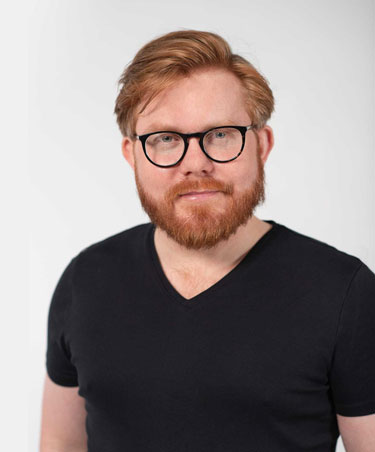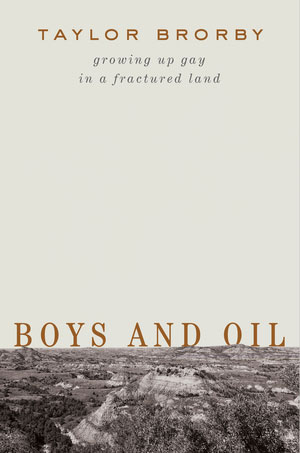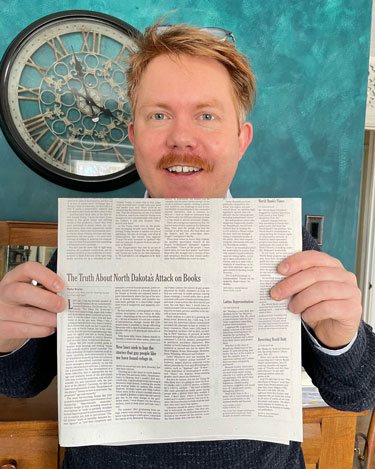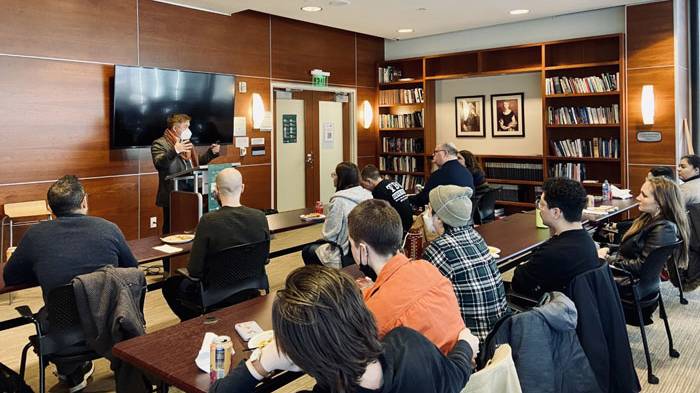Faculty Feature: Taylor Brorby

Taylor Brorby is the Annie Clark Tanner Teaching & Research Fellow in Environmental Humanities, a partnership between the U of U Environmental Humanities Program and the Tanner Humanities Center. Taylor is currently teaching the Environmental Humanities Writing Seminar and working on a second memoir focused on diabetes, including both his personal experience with type 1 diabetes and our 3,500-year understanding of the chronic illness. See Taylor speak this Wednesday, March 29 on campus! Event info here.
Taylor grew up in North Dakota, and much of his work addresses life and environment in rural America, specifically the prairie. Taylor is the author of Boys and Oil: Growing up gay in a fractured land, Crude: Poems, Coming Alive: Action and Civil Disobedience, and co-editor of Fracture: Essays, Poems, and Stories on Fracking in America. His work has been supported by grants and fellowships from the National Book Critics Circle, the MacDowell Colony, the Stone Barns Center for Food and Agriculture, Mesa Refuge, Blue Mountain Center, and the North Dakota Humanities Council. Taylor’s work has appeared in The Huffington Post, Orion Magazine, The Arkansas International, Southern Humanities Review, North Dakota Quarterly, and has appeared in numerous anthologies. He is a contributing editor at North American Review and serves on the editorial boards of Terrain.org and Hub City Press.
In March, Taylor and I discussed his recent and upcoming memoirs, the intersections of the personal and the political, and his experience as a writer and teacher within the field of environmental humanities.
Brooke: First off, congrats on publishing Boys and Oil last year! You’re now working on a new memoir that focuses on diabetes. What parts of your personal story and larger political issues do each of these memoirs address?
Taylor: I feel like I'm not political, or I don't want to be political. But since I am who I am, I live in a system of politics. People find the fact that I'm gay as political. Or if you're disabled, it means you're political because systems as they’re currently designed aren't meant to support people like me. The other layer of politics is being from rural America. There are very few writers from rural America, partly because we're disadvantaged and it's so damn hard to get out of rural America to have a type of livelihood that supports writing. Both books are linked to activism, because just having a disabled body or being gay in the wider world means that largely it's difficult to fit in. With Boys and Oil, I got permission to publish it because that book simply didn't exist. Most of the time, outside of our nerdy environmental circles, if you said, “Name another known book that explores issues related to environment and sexuality around being queer,” people don't sort of rattle off book names compared to if you say, “Name famous environmental writers of the American West.”

In Boys and Oil, there’s the environmental interest alongside being gay. It’s more multi-layered in the diabetic book. Who thinks about gay diabetic sex? We might need a section on that. Then, there’s another section on how diabetics are living in the time of climate change. Bringing people into a lived experience, for me, seems to be the best tool to wake people up. I less try to sermonize and more try to get people to feel. I think good literature shouldn't tell you what to think, it should get you to feel. I also do my research. In Boys and Oil, I want people to understand how the prairie works and the natural history of that area. In the diabetic memoir, there's a long 3500-year thread of humans understanding of the disease mirroring different events in my life. I like a reader to get a two for one deal. It's not just about me.
Brooke:You recently published an essay in The New York Times titled “The Real Reason North Dakota Is Going After Books and Librarians.” In that piece, you also connect the personal and the political. What motivated you to write this piece?
Taylor: I had been publishing op-eds around North Dakota. I think part of why it eventually landed in The New York Times is because they haven’t been reporting on this. A lot of states are proposing legislation to censor their libraries. Libraries, as I write about in that piece, were such safe refuges for me. As a friend said, “libraries are our ecumenical churches” where we all worship because they're houses of knowledge and stories. When I would go to the library growing up, I would have access to books by people who look like me and people who don't look like me and with complicated things like sexuality in the quiet Northern Great Plains where people don't talk about such things. Access to stories help people like me feel less alone.

Most of the censorship legislation is coming in tandem with anti-queer legislation. A lot of the censorship is around obscenity. In the bills in North Dakota, they'll say, “depictions of perverted sexual acts” or “deviant sexual behavior.” Well, we know this language was used historically to describe gay men in this country and queer people in general. This is harkening back to a 1950s mentality before homosexuality gets decriminalized. So, anti-queer legislation is coming in tandem with anti-library bills, and elected officials are trying to disadvantage queer people, particularly the trans community. They're also trying to simultaneously limit resources of information for the people impacted by this hateful legislation.
Brooke: How do you see your work situated within the larger field of Environmental Humanities?
Taylor: Wallace Stegner is a big hero of mine. He lived all over, but he spent at least a hot minute growing up in North Dakota, and I thought, well, one of the twentieth century’s really important writers lived where I grew up, maybe I could also be a writer. I'm not necessarily writing in those conservation veins. But his concepts about people who are always following the next gold rush, that resonates with me, growing up in the midst of an oil boom in North Dakota. I really like Pam Houston, I'd love to be linked with her, or Terry Tempest Williams. These people have been influential in my thinking. But more specifically to my bioregion, someone no one reads anymore is a guy named Paul Gruchow. He had a book called Journal of a Prairie Year and then another called Grass Roots: The Universe of Home. In Grass Roots: The Universe of Home, there's this essay called “What We Teach Rural Children,” and it is like the story of my life. If you're successful, you leave home, and the unsuccessful people stay behind. He writes about the prairie in the way I see it. He would talk about the industrialization of farming in the twentieth century with phrases like “we’ve made the country safe for machines, not people.” He's my lodestar in my thinking. I wish more people read him. In addition to him, another prairie writer is a woman named Meridel Le Sueur, who no one reads anymore. She was a socialist writer who lived to be nearly a billion. She was way ahead of her time, was working with the Wobblies, and was writing certifiably political propaganda. But she also wrote essays that were really politically nuanced and did some cultural work. Much of my thinking has been formed by twentieth century prairie writers and wondering why there aren't more writers from the prairie living on the prairie currently.
Brooke: What can we here in Utah learn from the prairie?
Taylor: I noticed I have a lot more neck pain in Utah, because you're looking up at the mountains all the time. In my world, not only would you stare far out, but to understand the place you also have to look down or you have to get on your knees. You have to get comfortable with dirt and dust—where we're all returning. During the Homestead Act, they would call that huge expanse, from basically Indiana to the Rocky Mountains, the American desert. That's how it was viewed, and desert wasn't a compliment. That influenced how our interstate system has developed—you can start going real fast across the prairie. But I think there’s a huge lack of understanding. One hundred acres of prairie can support 3,000 species of just insects. That's not even talking about the variety of grasses that are rooted to it, much less large fauna. Its diversity is why it has some of the best soil on the planet. But the prairie is intimidating because it's not tall. There aren't many focal points for our eyes. It's a region where some of the first Scandinavian settlers started to go mad because during winter it's a gray sky on gray snow. If you're used to mountains, there is nothing to break your eye. So, in many ways I think white people rush through it, because it reminds us of how small we are. We know the Wasatch Front is beautiful. We know Arches is beautiful—we can see it. They seem more like tweets, to me, where to understand the prairie is like a long novel—it takes time to read it and understand it. I think the prairie slows us down, which is helpful in a fast world.
Brooke: You are both a writer and a teacher. How do these two roles go together for you? What do you enjoy about teaching?
Taylor: I think teaching informs writing and vice versa. I think teaching is a wonderful laboratory experience. Students hate on some of the books I've assigned, but I often say over and over, “I don't give a shit if you like or don't like the book, I care more about what you learn.” I'm trying to hit home how to read like a writer rather than a critic. If you didn't like this, you have to go deeper to say, “Why didn't I? What wasn't working for me?” Teaching helps me reaffirm my taste. But it also reminds me how important it is to teach basics like, how does dialogue work? How do you set up a scene? How do you think about an audience?

Working with the 14 or so students I have in the Environmental Humanities writing seminar is just enlivening. They're bringing a lot of passion and a lot of different perspectives, not only from where they've grown up, but also they're younger than I am and their concerns are different than mine in some ways. So it keeps me fresh and keeps me curious. It also gives me something to do rather than just stare at my yellow legal pad and try to write sentences that don't suck. I’m calling my class The Memoir of Extraction, but we're reading people like Roxane Gay. She got gang raped, and then she chose to become morbidly obese as a way of literally not fitting in and becoming, as she would say, grotesque so that people wouldn't find her sexually attractive. That's a type of extraction, but we might not think of that in conversation with what's happening in Vernal, Utah.
Brooke: In the fall, you’ll start a new position as an assistant professor of creative nonfiction at the University of Alabama. What are you looking forward to in that role?
Taylor: I will be Mr. Nonfiction there. Somehow the University of Alabama has one of the premier graduate creative writing programs in the country. It'll be enlivening to be at a program of that stature. And it's a four year program. I didn't even know four-year MFA programs existed! More than anything a writer needs time. Four years is plenty of time to get a viable book done. Wouldn’t that be great, if by the end of your program, we could get your book placed somewhere and you could get your start into a career as a writer? I just love being around people who are passionate about sentences. I also love being around students who might be thinking about subjects far beyond themselves. And personally, it is also very exciting as a writer to be taken seriously by other colleagues and by a university that’s saying, we want to support your career and what you want to do.
Brooke: What advice do you have for our students, particularly those who may want to pursue a career in writing or academia?
Taylor: I think being really open to saying “yes” is important. I have found the good fortune I've had in my life or career because I've said yes to opportunities. It’s not that things have been easy for me. But every opportunity has led to other opportunities and interesting people. If I had not done Fracture and then emailed this guy named Jeff McCarthy at the University of Utah, I wouldn't have met you, and I wouldn't have met Jeff. I wouldn't have felt this kinship to then think, as this fellowship evolved, that maybe I have a shot at aiming for that.
I recently told my graduate students, one of the things you really need to understand in life is you need to be kind, you need to not be a gossip, and you somehow also need to be memorable.
I think part of what it takes to be a writer is to be open and curious, to say yes, and then it's just spending a lot of time alone and reading a lot and liking those things. Annie Dillard has an essay called “Write Till You Drop” about the writing process. She tells this story about a young painter who comes up to a senior painter and says, “Oh, Master, do you think I could be a painter?” And he said, “Well, that depends. Do you like the smell of paint?” To be a writer, you have to like sentences. Poets are obsessed with other poets. So, lean into your obsessions. I like being around obsessed people. In writing, it's helpful to have obsessions, because you'll get a lot of mileage out of it. If you let your passions guide you, it helps keep you moving.
Categories
Featured Posts
Tag Cloud
- community engagement (12)
- outdoor recreation (2)
- outreach (1)
- alumni (3)
- admissions (1)
- faculty (8)
- practitioner-in-residence (2)
- cultural anthropology (1)
- utah award in the environmental humanities (1)
- environmental justice (2)
- STEMCAP (2)
- STEM (2)
- water (1)
- communications (2)
- humanities (1)
- Taft-Nicholson Center (1)
- director (3)
- student (5)
- API (1)
- Asian American (1)
- Pacific Islander (1)
- graduation (1)
- research (3)
- thesis (1)
- project (1)
- Indigenous (1)
- Shoshone (1)
- Great Salt Lake (2)
- Bear River (1)
- land acknowledgement (1)
- STEMAP (1)
- public engagement (1)
- science (1)
- science communication (1)
- Wilkes Center (1)
- climate change (1)
- climate science (1)
- climate policy (1)
- policymaking (1)
- funding (1)
- storytelling (1)
- radio (1)
- journalism (1)
- racial justice (1)
- outdoor education (1)
- writing (1)
- non-fiction (1)
- energy extraction (1)
- reading (1)
- environmental education (1)
- affect theory (1)
- media (1)
- rhetoric (1)
